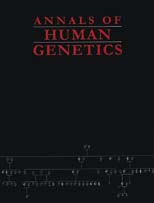Crossref Citations
This article has been cited by the following publications. This list is generated based on data provided by
Crossref.
Trowsdale, John
2001.
Genetic and Functional Relationships between MHC and NK Receptor Genes.
Immunity,
Vol. 15,
Issue. 3,
p.
363.
Akey, Joshua M.
Zhang, Ge
Zhang, Kun
Jin, Li
and
Shriver, Mark D.
2002.
Interrogating a High-Density SNP Map for Signatures of Natural Selection.
Genome Research,
Vol. 12,
Issue. 12,
p.
1805.
Hedrick, Philip
2002.
Reproductive Science and Integrated Conservation.
p.
97.
Keller, Laurent
and
Parker, Joel D
2002.
Behavioral Genetics: A Gene for Supersociality.
Current Biology,
Vol. 12,
Issue. 5,
p.
R180.
Holt, William V.
Pickard, Amanda R.
Rodger, John C.
and
Wildt, David E.
2002.
Reproductive Science and Integrated Conservation.
p.
21.
Navarro, Arcadio
and
Barton, Nick H
2002.
The Effects of Multilocus Balancing Selection on Neutral Variability.
Genetics,
Vol. 161,
Issue. 2,
p.
849.
Hedrick, Philip W.
2002.
PATHOGEN RESISTANCE AND GENETIC VARIATION AT MHC LOCI.
Evolution,
Vol. 56,
Issue. 10,
p.
1902.
Raggatt, Liza J.
and
Partridge, Nicola C.
2002.
HMG-CoA Reductase Inhibitors as Immunomodulators.
Drugs,
Vol. 62,
Issue. 15,
p.
2185.
Webster, Matthew T.
Wells, R.Spencer
and
Clegg, John B.
2002.
Analysis of variation in the human β-globin gene cluster using a novel DHPLC technique.
Mutation Research/Fundamental and Molecular Mechanisms of Mutagenesis,
Vol. 501,
Issue. 1-2,
p.
99.
Buhler, S.
Sanchez‐Mazas, A.
Zanone, R.
Djavad, N.
and
Tiercy, J.‐M.
2002.
PCR‐SSOP molecular typing of HLA‐C alleles in an Iranian population.
Tissue Antigens,
Vol. 59,
Issue. 6,
p.
525.
Hedrick, Philip W.
2002.
PATHOGEN RESISTANCE AND GENETIC VARIATION AT MHC LOCI.
Evolution,
Vol. 56,
Issue. 10,
p.
1902.
SALZANO, FRANCISCO M.
2002.
Molecular variability in Amerindians: widespread but uneven information.
Anais da Academia Brasileira de Ciências,
Vol. 74,
Issue. 2,
p.
223.
Pyo, Chul-Woo
Hur, Seong-Suk
Kim, Yang-Kyum
Choi, Hee-Baeg
Kim, Tae-Yoon
and
Kim, Tai-Gyu
2003.
Distribution of MICA alleles and haplotypes associated with HLA in the Korean population.
Human Immunology,
Vol. 64,
Issue. 3,
p.
378.
Wegner, K. M.
Reusch, T. B. H.
and
Kalbe, M.
2003.
Multiple parasites are driving major histocompatibility complex polymorphism in the wild.
Journal of Evolutionary Biology,
Vol. 16,
Issue. 2,
p.
224.
Chung, C.
Leib, S. R.
Fraser, D. G.
Ellis, S. A.
and
McGuire, T. C.
2003.
Novel classical MHC class I alleles identified in horses by sequencing clones of reverse transcription‐PCR products.
European Journal of Immunogenetics,
Vol. 30,
Issue. 6,
p.
387.
Ober, Carole
Aldrich, Carrie L.
Chervoneva, Inna
Billstrand, Christine
Rahimov, Fedik
Gray, Heather L.
and
Hyslop, Terry
2003.
Variation in the HLA-G Promoter Region Influences Miscarriage Rates.
The American Journal of Human Genetics,
Vol. 72,
Issue. 6,
p.
1425.
Block, Matthew S.
Hansen, Michael J.
Van Keulen, Virginia P.
and
Pease, Larry R.
2003.
MHC Class I Gene Conversion Mutations Alter the CD8 T Cell Repertoire.
The Journal of Immunology,
Vol. 171,
Issue. 8,
p.
4006.
Reche, Pedro A.
and
Reinherz, Ellis L.
2003.
Sequence Variability Analysis of Human Class I and Class II MHC Molecules: Functional and Structural Correlates of Amino Acid Polymorphisms.
Journal of Molecular Biology,
Vol. 331,
Issue. 3,
p.
623.
Bernatchez, L.
and
Landry, C.
2003.
MHC studies in nonmodel vertebrates: what have we learned about natural selection in 15 years?.
Journal of Evolutionary Biology,
Vol. 16,
Issue. 3,
p.
363.
Gibert, M.
and
Sanchez‐Mazas, A.
2003.
Geographic patterns of functional categories of HLA‐DRB1 alleles: a new approach to analyse associations between HLA‐DRB1 and disease.
European Journal of Immunogenetics,
Vol. 30,
Issue. 5,
p.
361.




